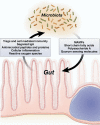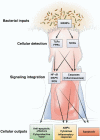Microbes in gastrointestinal health and disease
- PMID: 19026645
- PMCID: PMC2892787
- DOI: 10.1053/j.gastro.2008.10.080
Microbes in gastrointestinal health and disease
Abstract
Most, if not all, animals coexist with a complement of prokaryotic symbionts that confer a variety of physiologic benefits. In humans, the interaction between animal and bacterial cells is especially important in the gastrointestinal tract. Technical and conceptual advances have enabled rapid progress in characterizing the taxonomic composition, metabolic capacity, and immunomodulatory activity of the human gut microbiota, allowing us to establish its role in human health and disease. The human host coevolved with a normal microbiota over millennia and developed, deployed, and optimized complex immune mechanisms that monitor and control this microbial ecosystem. These cellular mechanisms have homeostatic roles beyond the traditional concept of defense against potential pathogens, suggesting these pathways contribute directly to the well-being of the gut. During their coevolution, the bacterial microbiota has established multiple mechanisms to influence the eukaryotic host, generally in a beneficial fashion, and maintain their stable niche. The prokaryotic genomes of the human microbiota encode a spectrum of metabolic capabilities beyond that of the host genome, making the microbiota an integral component of human physiology. Gaining a fuller understanding of both partners in the normal gut-microbiota interaction may shed light on how the relationship can go awry and contribute to a spectrum of immune, inflammatory, and metabolic disorders and may reveal mechanisms by which this relationship could be manipulated toward therapeutic ends.
Figures



References
-
- McFall-Ngai M. Adaptive immunity: care for the community. Nature. 2007;445:153. - PubMed
-
- McFall-Ngai MJ. Identifying “prime suspects”: symbioses and the evolution of multicellularity. Comp Biochem Physiol B Biochem Mol Biol. 2001;129:711–723. - PubMed
-
- McFall-Ngai MJ. Unseen forces: the influence of bacteria on animal development. Dev Biol. 2002;242:1–14. - PubMed
-
- Dale C, Moran NA. Molecular interactions between bacterial symbionts and their hosts. Cell. 2006;126:453–465. - PubMed
-
- Hickman C. How have bacteria contributed to the evolution of multicellular animals? In: McFall-Ngai MJ, editor. The influence of cooperative bacteria on animal host biology. Cambridge University Press; New York: 2005. pp. 3–32.
Publication types
MeSH terms
Substances
Grants and funding
LinkOut - more resources
Full Text Sources
Other Literature Sources
Medical

